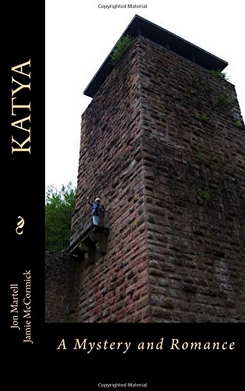 Katya: A Mystery and Romance, by Jon Martell and Jamie McCormick, explores the depths of personal secrets.
Katya: A Mystery and Romance, by Jon Martell and Jamie McCormick, explores the depths of personal secrets.
A woman’s body is discovered inside a medieval tower in rural Germany. A detective unaccustomed to investigating suspicious deaths attempts to piece together the clues. He starts to wonder if the events leading to the death go back thirty years and takes place in Germany and America.
What happened in the tower? And are people in today’s world allowed to have secrets?
This mystery is a curious twist on the genre. Officer Max Forscher is a small town policeman and he’s perfectly content not having a high profile caseload. When he starts piecing together the mystery, Forscher realizes that under the surface is a secret that could destroy the reputation of the dead woman. Also, disclosing the secret could be disastrous for her family and loved ones.
In today’s information and social media age, is it possible for people to keep a secret? And more importantly, is it ethically and morally acceptable? On the flip side, is it okay for others to dig into our lives and unearth what individuals want to remain unknown?
Forscher and his colleague Sebastian discuss this and according to Sebastian, secrets technically no longer exist except as a social convention:
I let you believe you have secrets and you let me believe in mine. It’s easier that way, and better.
The issue of secrets is the heart of the novel. For a good part of the story, the reader anticipates what the “truth” is and the possible ramifications for the woman’s family members. This is the source of distress, not the actual cause of the woman’s death. Yes, there are questions surrounding how she lost her life while on holiday in Germany. But her death occurs inside a decrepit, dark, and dank tower out of the watchful eye of technology, but most of her past, thanks to the Internet, can be explored and pieced together.
The authors leave a lot up to the reader to decide what’s right and wrong. This is interesting, because even the most honest person, more than likely has something from their past that they’d prefer stay in the past. Life is never easy and everyone has made a mistake, had a lapse of judgment, and/or wants to protect a loved one. The reader brings her own bias to the story.
However, the authors also expect the reader to believe that they’ve received all the pertinent information to make their decision. And if there is a flaw in this story, that’s it. Sometimes it’s hard to know if we know everything, since there are at least two sides to every story. While this can be seen as a flaw by some, it also shows the brilliance of the story. Even when people think they have all the facts to make an informed decision, how is it possible to know that’s really the case? And how does one set aside personal experiences and fears to make the best choice, especially when innocent and not-so-innocent lives are at stake?
When is it okay to destroy a person’s reputation for the sake of truth? And, how many could be ruined from the past?
Katya is a suspenseful mystery on many levels and it opens up a debate about the invasiveness of the technological age. The story raises questions and leaves it to the reader to decide what’s right.
Links
Book Site
Amazon
Goodreads
Review Overview
Design
Content
Editing
Get an Editorial Review | Get Amazon Sales & Reviews | Get Edited | Get Beta Readers | Enter the SPR Book Awards | Other Marketing Services























Leave A Comment